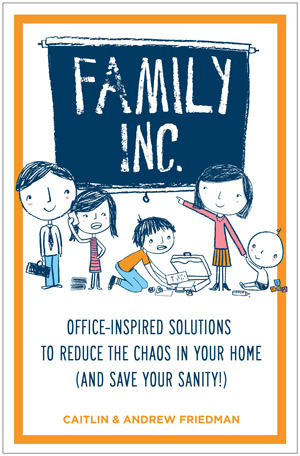Book Club: Family Inc.
This month, the Pregnancy & Newborn Book Club dives into […]

Q: At what point did you realize you needed to make changes in your own home?
C&AF: After several years of things slipping through the cracks and the endless discussions about who was doing what, we knew things had to change. How many times can you argue about forgotten birthday presents, late bills, lost tax returns and the need for a new babysitter without losing your mind? So the issue for us wasn’t recognizing that we had to do things differently, it was how to do things differently. Luckily, during a long drive when we actually had time to list everything we had going on, we figured something out—that the key to reducing stress, arguments and resentment is to treat the running of your household like a company. By using the systems and skills that you use at work (filing, job descriptions, action plans) you can easily get things under control at home. We met while working together so we knew firsthand how weekly meetings and even your basic filing system helps things run smoothly … so why not try it at home?
Q: What are the biggest indicator that a family needs to make changes?
C&AF: If you frequently find yourselves struggling to catch up with everything that needs to be done around the house, arguing over little things, putting off making bigger life changes because it feels overwhelming, feeling like you aren’t spending quality time with anyone or have no time for yourself, then your family needs to make some changes.
Q: You suggest running your family similar to an office—doesn’t that make your life seem like more work?
C&AF: We feel that aspects of your home to-do lists are work. It’s not like you are emotionally invested in taking out the garbage, doing the laundry or paying the bills, yet because it’s at home it can often feel personal. And let’s be honest, some of what we need to do to keep the home running isn’t all that fun—so why not try and figure out the most efficient way to get it done?
Q:When couples first sit down to rearrange their household responsibilities, what is the most important thing for them to remember?
C&AF: A few important things to remember:
- Whenever possible delegate household responsibilities based on skills and interest. If one of you is more organized than the other then perhaps they should take on the yearly tax prep. If you are an excellent manager then you should take on hiring and training everyone from the babysitter to the teenager you hired to mow the lawn.
- Let the past go. Chances are that one of you has been doing more than the other—it happens all the time. See this as an opportunity to make things even between you and don’t hold on to past resentments.
- Be honest about what you can take on and get done each week, each month, and each year.
Q:Trying to fit in a weekly meeting as you suggest in an already busy life seems like it would add more stress. What are some ways to avoid this feeling?
C&AF: You are just going to have to trust us that after the first meeting you will feel so much better about what’s on your plate that it’s worth the little bit of time it takes to meet. Wouldn’t you rather sit down and split up the workload than argue about the pile of dirty laundry, the empty refrigerator or the unpaid bills one more time? And wouldn’t you rather take a few minutes each week to lay out an action plan for retirement planning, paying down debt and saving for college than realizing too late that it never happened?
Q:Running a household can sometimes fall only on the parent’s shoulders. How can the children get involved?
C&AF: Bringing your kids into family meetings offers many learning opportunities. When they are younger you can give your children a few of their own jobs to start teaching them responsibility (we actually include a list of appropriate jobs by age in the book). When they are a little older, children can take on more, including adding their games and afterschool activities to the family calendar. Showing them they they have a role in the household and allowing them to contribute in their own way will inspire confidence and foster independence. We have 8-year-old twins and we’ve learned that if we review their school calendars together and ask them to remember things like their own snack days then they are more engaged in the day-to-day details of how things get done. They now know that if they have a snack day we have to figure out what and how much to get, as well as make time to go to the store. Even owning this small task has made our kids feel more confident, and there are a million similar opportunities to involve your children.
Q: What is the biggest financial organization tip that you would suggest?
C&AF: Get your paperwork in order by buying an accordion file for all of the bills you pay and label it by vendor (electric company, cable, cell phone provider, etc.) Having everything labeled and filed will make your life a lot easier come tax season.
Q: Speaking of finances, arguments are inevitable no matter how organized the family and can derail even a well-run household. How do couples get past the angry words and back on track?
C&AF: Looking at your to-do list as work will actually help diffuse the tension between you. This is true of the finances as well. If you look at your household as a business, you can look at what you ow and what you bring in and together make a plan for where it all goes. This shouldn’t be a personal discussion—because that’s when things get heated. It should be about the numbers. You need to enter the discussion about finances with a clean slate and not bring with you the history of arguments. If you own money, then together make a plan for paying it off. If you need to start saving, then together find places to cut spending. If you find you have a little extra money, figure out together where you want that money to go.







